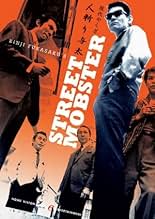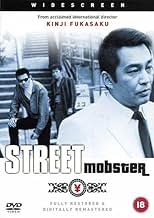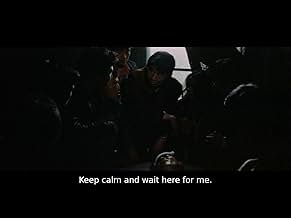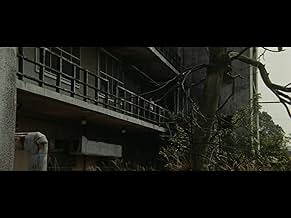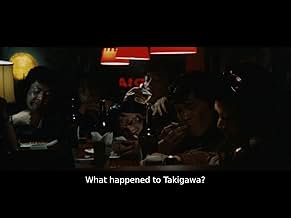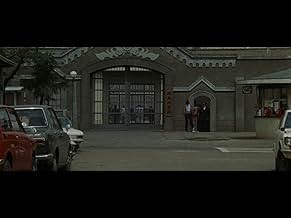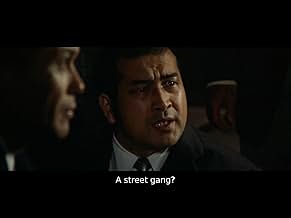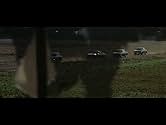AVALIAÇÃO DA IMDb
7,1/10
1,3 mil
SUA AVALIAÇÃO
Adicionar um enredo no seu idiomaA yakuza, who has an untamed rage and lack of respect for authority, finds himself leading the remnants of the gang he once belonged to in order to secure an area of their own.A yakuza, who has an untamed rage and lack of respect for authority, finds himself leading the remnants of the gang he once belonged to in order to secure an area of their own.A yakuza, who has an untamed rage and lack of respect for authority, finds himself leading the remnants of the gang he once belonged to in order to secure an area of their own.
- Direção
- Roteiristas
- Artistas
- Direção
- Roteiristas
- Elenco e equipe completos
- Produção, bilheteria e muito mais no IMDbPro
Avaliações em destaque
Street Mobster is a violent Japanese gangster movie by prolific director Fukasaku Kinji who would later on direct influential genre masterpieces such as Battles Without Honor and Humanity, Graveyard of Honor and Yakuza Graveyard. Western audiences know him as the director of dystopian action thriller Battle Royale which was the last movie he was able to complete.
The story of this movie is rather simple. It follows the life of a violent gangster who attacks the members of an inflluential clan who try to extort money from him and associates. He spends some time in prison but soon forms a new gang that is particularly violent. He ultimately gets injured and is temporarily forced to join a bigger family for protection. When another and even bigger family from Osaka tries to increase its influence in Kawasaki, the film's violent antagonist decides to disrespect common conventions and brutally disrespects the different gangster families. The three involved families come to the only reasonable conclusion: they must cooperate to eliminate the antagonist and his associates to preserve peace.
The most interesting element about Street Mobster is its violent, nihilistic and egoistic antagonist who isn't interested in compromises, peace or truces. He desires to become the biggest gangster boss in the country by any means necessary. While this character is extremely dislikeable, he is brutally consequent and honest in his actions and therefore more complex and profound than one might think at first contact. The movie impresses with numerous violent scenes supported by dynamic camera work that have aged rather well and can still be considered offensive nowadays. The film has frantic pace and entertains from start to finish.
On the negative side, there are very few characters to sympathize or empathize with. As opposed to Western gangster movies, even the victims and outsiders in organized crime come off as careless and despicable. The story is also extremely thin and quite predictable. The action scenes are quite intense but also rather repetitive. The movie impresses at first contact but lacks creativity, depth and diversity.
To conclude, you should watch Street Mobster if you are looking for a particularly brutal, entertaining and fast gangster movie that has stood the test of time. This film certainly entertains while it last but doesn't leave any deeper impression due to its thin story line. Street Mobster is a feast for genre fans but can't compete with Fukasaku Kinji's later works.
The story of this movie is rather simple. It follows the life of a violent gangster who attacks the members of an inflluential clan who try to extort money from him and associates. He spends some time in prison but soon forms a new gang that is particularly violent. He ultimately gets injured and is temporarily forced to join a bigger family for protection. When another and even bigger family from Osaka tries to increase its influence in Kawasaki, the film's violent antagonist decides to disrespect common conventions and brutally disrespects the different gangster families. The three involved families come to the only reasonable conclusion: they must cooperate to eliminate the antagonist and his associates to preserve peace.
The most interesting element about Street Mobster is its violent, nihilistic and egoistic antagonist who isn't interested in compromises, peace or truces. He desires to become the biggest gangster boss in the country by any means necessary. While this character is extremely dislikeable, he is brutally consequent and honest in his actions and therefore more complex and profound than one might think at first contact. The movie impresses with numerous violent scenes supported by dynamic camera work that have aged rather well and can still be considered offensive nowadays. The film has frantic pace and entertains from start to finish.
On the negative side, there are very few characters to sympathize or empathize with. As opposed to Western gangster movies, even the victims and outsiders in organized crime come off as careless and despicable. The story is also extremely thin and quite predictable. The action scenes are quite intense but also rather repetitive. The movie impresses at first contact but lacks creativity, depth and diversity.
To conclude, you should watch Street Mobster if you are looking for a particularly brutal, entertaining and fast gangster movie that has stood the test of time. This film certainly entertains while it last but doesn't leave any deeper impression due to its thin story line. Street Mobster is a feast for genre fans but can't compete with Fukasaku Kinji's later works.
Outlaw Killer or as it says in the film, Street Mobster, is a bloody violent look into a totally self-destructive renegade street punk that can't ever seem to back down from a fight, no matter how suicidal. Truly a hilarious, incredibly charismatic character. So funny.
The film follows him as he talks about his youth, his incarceraton and picks up with him creating a new gang. Parts are a bit too melodramatic, especially at the end, but the characters are well-crafted and the action sequences are frenetic and fun.
A unique view of yakuza and street punk life in Japan in the early '70s from crazy-guy Fukasaku, the man behind Tora! Tora! Tora! and the fantastic Battle Royale.
The film follows him as he talks about his youth, his incarceraton and picks up with him creating a new gang. Parts are a bit too melodramatic, especially at the end, but the characters are well-crafted and the action sequences are frenetic and fun.
A unique view of yakuza and street punk life in Japan in the early '70s from crazy-guy Fukasaku, the man behind Tora! Tora! Tora! and the fantastic Battle Royale.
As can be expected from Japanese master Kinji Fukasaku, "Street Mobster" is a fast paced, stylistic and violent depiction of a low level Yakuza thug who punches to the beat of his own fist.
Bunta Sugawara plays Okita, a small time hood recently released from prison. Upon his arrival to the outside world, he finds the underworld he left behind changed. A new crew runs his old stomping grounds, and he is lost and abandoned. After teaming up with some hoodlums, Okita sets his sights on bigger things, which all leads to his downward spiral in the Japanese underworld.
Fukasaku directs this Yakuza flick with his usual visual tour de force. You can expect freeze frames, quick cuts, fast zooms, hand- held camera work, dutch angles, voice overs, a mixture of b&w and color cinematography, etc. The energy that the director supplies from behind the camera perfectly captures the momentum in which the lead characters react to their daily lives. There is a lot of action, with characters often breaking out into fights and chases at random. This kind of film needs to be taken with a grain of salt. The violence, like the melodrama and tacked on love interest, are over the top but enjoyable.
So sit back and relax. This lean, mean, fast flying fist machine of a film will keep you entertained and enthralled throughout.
Bunta Sugawara plays Okita, a small time hood recently released from prison. Upon his arrival to the outside world, he finds the underworld he left behind changed. A new crew runs his old stomping grounds, and he is lost and abandoned. After teaming up with some hoodlums, Okita sets his sights on bigger things, which all leads to his downward spiral in the Japanese underworld.
Fukasaku directs this Yakuza flick with his usual visual tour de force. You can expect freeze frames, quick cuts, fast zooms, hand- held camera work, dutch angles, voice overs, a mixture of b&w and color cinematography, etc. The energy that the director supplies from behind the camera perfectly captures the momentum in which the lead characters react to their daily lives. There is a lot of action, with characters often breaking out into fights and chases at random. This kind of film needs to be taken with a grain of salt. The violence, like the melodrama and tacked on love interest, are over the top but enjoyable.
So sit back and relax. This lean, mean, fast flying fist machine of a film will keep you entertained and enthralled throughout.
This movie is the life story of a punk named Isamu--with the bulk of it following his insane path following his release from prison. While the idea of a mobster being a sociopath is no surprise, Isamu is peculiar even among the yakuza. This is because he also has an insane need for excitement and is incredibly self-destructive and angry--so much so that you know he cannot continue his path for long. After all, taking on the yakuza (sort of like the Japanese mafia) nearly single-handedly is just plain nuts! Yet, this crazed punk assembles a very small gang and attempts to do just that!
"Street Mobster" is one of the most violent and nihilistic Japanese films I have ever seen. Its violence is vicious, uncaring and filled with pure rage. And, as a portrait of a thug, it IS effective and realistic. But, with graphic rapes, stabbing after stabbing after stabbing, it makes you wonder who the audience would be for this blood-fest. Plus, after raping one woman, the lady then has a twisted love-hate relationship with him that is just plain unsavory. Not a movie I enjoyed and one I am loathe to recommend because it's so nasty, but it IS unflinching and pulls no punches.
"Street Mobster" is one of the most violent and nihilistic Japanese films I have ever seen. Its violence is vicious, uncaring and filled with pure rage. And, as a portrait of a thug, it IS effective and realistic. But, with graphic rapes, stabbing after stabbing after stabbing, it makes you wonder who the audience would be for this blood-fest. Plus, after raping one woman, the lady then has a twisted love-hate relationship with him that is just plain unsavory. Not a movie I enjoyed and one I am loathe to recommend because it's so nasty, but it IS unflinching and pulls no punches.
"Street Mobster" is part of the early 70's crop of Japanese yakuza films that were spearheaded by Kinji Fukasaku, who is once again behind the helm without missing a beat. All the mandatory elements that make a yakuza film work are present: forming and switching of alliances between yakuza families, fistfights, stabbings, a guerilla view of Tokyo, frenetic action sequences, sleaze. But whereas a lesser, more workmanlike director would work these things from a checklist, Fukasaku instills so much energy that even the most rudimentary of things are a pleasure to watch.
Indeed "Street Mobster" is packed full of raw, animalistic energy that more than makes up for the fairly predictable nature of the story. In typical yakuza fashion, yakuza gets out of prison after doing time for a hit, forms a small gang, takes on the bigger families, carnage ensues. It's all part of what makes the genre such pure, unadulterated fun though. However all these typical genre staples take a wildly exhilarating life of their own through Fukasaku's hyperkinetic and gritty style. There's no glamour or glory to be found in Fukasaku's violence: only brutality. Stylization is kept to a bare minimum with lots of hand-held shots and cameras constantly on the move that blend in with the action. The same guerilla tactics are used for the exterior shots that capture the seedy, downtrodden side of a Tokyo full of possibilities. Dilapidated warehouses, cheap bath houses, dark rooms, dim-lit diners, rundown neighborhoods with wooden cabins, again there's no glitz or neon lights shining in Fukasaku's yakuza universe.
Regular collaborator Bunta Sugawara takes on the role of the titular Street Mobster, but gone is his cool (and sullen) demeanor from other yakuza films. He's responsible for some serious scenery consumption, wildly overacting, often approaching even Kikuchiyo territory (Mifune's character from Seven Samurai) but with the same honest, natural approach that made him the great actor that he was. He's also one of the best physical actors I've seen and you can see it paying off in dividends with every fight scene he gets involved with (and there are lots, don't worry).
If you'd like to see a different kind of gangster film, one that relies more on viscera, grittiness and raw energy than faux glamour and hip mafiosos, you should definitely invest in Street Mobster. It's pulpy, fast-paced and balls-out. 70's Japanese action cinema in top form
Indeed "Street Mobster" is packed full of raw, animalistic energy that more than makes up for the fairly predictable nature of the story. In typical yakuza fashion, yakuza gets out of prison after doing time for a hit, forms a small gang, takes on the bigger families, carnage ensues. It's all part of what makes the genre such pure, unadulterated fun though. However all these typical genre staples take a wildly exhilarating life of their own through Fukasaku's hyperkinetic and gritty style. There's no glamour or glory to be found in Fukasaku's violence: only brutality. Stylization is kept to a bare minimum with lots of hand-held shots and cameras constantly on the move that blend in with the action. The same guerilla tactics are used for the exterior shots that capture the seedy, downtrodden side of a Tokyo full of possibilities. Dilapidated warehouses, cheap bath houses, dark rooms, dim-lit diners, rundown neighborhoods with wooden cabins, again there's no glitz or neon lights shining in Fukasaku's yakuza universe.
Regular collaborator Bunta Sugawara takes on the role of the titular Street Mobster, but gone is his cool (and sullen) demeanor from other yakuza films. He's responsible for some serious scenery consumption, wildly overacting, often approaching even Kikuchiyo territory (Mifune's character from Seven Samurai) but with the same honest, natural approach that made him the great actor that he was. He's also one of the best physical actors I've seen and you can see it paying off in dividends with every fight scene he gets involved with (and there are lots, don't worry).
If you'd like to see a different kind of gangster film, one that relies more on viscera, grittiness and raw energy than faux glamour and hip mafiosos, you should definitely invest in Street Mobster. It's pulpy, fast-paced and balls-out. 70's Japanese action cinema in top form
Você sabia?
- ConexõesFeatured in Yakuza Eiga, une histoire du cinéma yakuza (2009)
Principais escolhas
Faça login para avaliar e ver a lista de recomendações personalizadas
Detalhes
- Data de lançamento
- País de origem
- Central de atendimento oficial
- Idioma
- Também conhecido como
- Street Mobster
- Empresa de produção
- Consulte mais créditos da empresa na IMDbPro
Contribua para esta página
Sugerir uma alteração ou adicionar conteúdo ausente

Principal brecha
By what name was Mafioso de Rua (1972) officially released in India in English?
Responda
